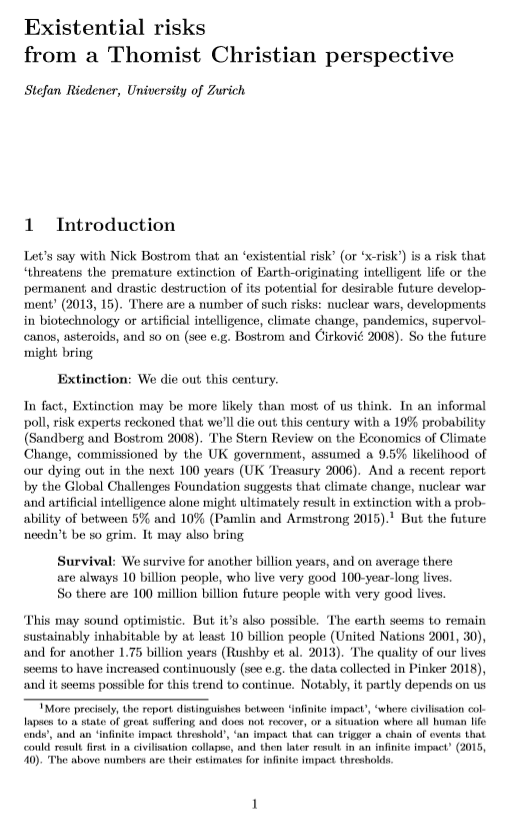Existential risks from a Thomist Christian perspective
Stefan Riedener (University of Zurich)
GPI Working Paper No. 1-2021, published in Effective Altrusim and Religion
Let’s say with Nick Bostrom that an ‘existential risk’ (or ‘x-risk’) is a risk that ‘threatens the premature extinction of Earth-originating intelligent life or the permanent and drastic destruction of its potential for desirable future development’ (2013, 15). There are a number of such risks: nuclear wars, developments in biotechnology or artificial intelligence, climate change, pandemics, supervolcanos, asteroids, and so on (see e.g. Bostrom and Ćirković 2008). [...]
Other working papers
Measuring AI-Driven Risk with Stock Prices – Susana Campos-Martins (Global Priorities Institute, University of Oxford)
We propose an empirical approach to identify and measure AI-driven shocks based on the co-movements of relevant financial asset prices. For that purpose, we first calculate the common volatility of the share prices of major US AI-relevant companies. Then we isolate the events that shake this industry only from those that shake all sectors of economic activity at the same time. For the sample analysed, AI shocks are identified when there are announcements about (mergers and) acquisitions in the AI industry, launching of…
Simulation expectation – Teruji Thomas (Global Priorities Institute, University of Oxford)
I present a new argument for the claim that I’m much more likely to be a person living in a computer simulation than a person living in the ground-level of reality. I consider whether this argument can be blocked by an externalist view of what my evidence supports, and I urge caution against the easy assumption that actually finding lots of simulations would increase the odds that I myself am in one.
The evidentialist’s wager – William MacAskill, Aron Vallinder (Global Priorities Institute, Oxford University) Caspar Österheld (Duke University), Carl Shulman (Future of Humanity Institute, Oxford University), Johannes Treutlein (TU Berlin)
Suppose that an altruistic and morally motivated agent who is uncertain between evidential decision theory (EDT) and causal decision theory (CDT) finds herself in a situation in which the two theories give conflicting verdicts. We argue that even if she has significantly higher credence in CDT, she should nevertheless act …

